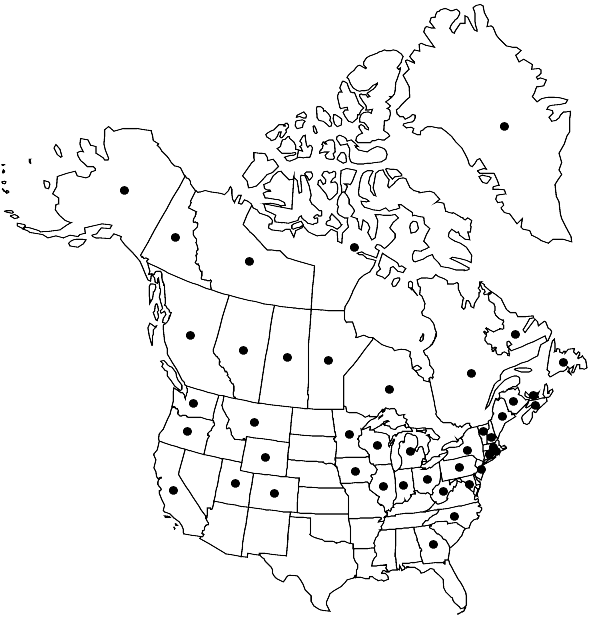Difference between revisions of "Polytrichum strictum"
J. Bot. (Schrader) 1800(1): 286. 1801,.
FNA>Volume Importer |
imported>Volume Importer |
||
| (6 intermediate revisions by 2 users not shown) | |||
| Line 10: | Line 10: | ||
|name=Polytrichum affine | |name=Polytrichum affine | ||
|authority=Funck | |authority=Funck | ||
| − | }}{{Treatment/ID/Synonym | + | |rank=species |
| + | }} {{Treatment/ID/Synonym | ||
|name=Polytrichum juniperinum var. affine | |name=Polytrichum juniperinum var. affine | ||
|authority=(Funck) Bridel | |authority=(Funck) Bridel | ||
| − | }}{{Treatment/ID/Synonym | + | |rank=variety |
| + | }} {{Treatment/ID/Synonym | ||
|name=Polytrichum juniperinum var. gracilius | |name=Polytrichum juniperinum var. gracilius | ||
|authority=Wahlenberg | |authority=Wahlenberg | ||
| + | |rank=variety | ||
}} | }} | ||
|hierarchy=Polytrichaceae;Polytrichum;Polytrichum strictum | |hierarchy=Polytrichaceae;Polytrichum;Polytrichum strictum | ||
| Line 30: | Line 33: | ||
|elevation=low to high elevations | |elevation=low to high elevations | ||
|distribution=Greenland;Alta.;B.C.;Man.;N.B.;Nfld. and Labr.;N.W.T.;N.S.;Nunavut;Ont.;P.E.I.;Que.;Sask.;Yukon;Alaska;Calif.;Colo.;Conn.;Ga.;Ill.;Ind.;Iowa;Maine;Md.;Mass.;Mich.;Minn.;Mont.;N.H.;N.J.;N.Y.;N.C.;Ohio;Oreg.;Pa.;R.I.;Utah;Vt.;Wash.;W.Va.;Wis.;Wyo.;South America;n Europe (Scandinavia;Svalbard);n;e Asia (Russia;Japan);Atlantic Islands (Faroes;Iceland);Antarctica. | |distribution=Greenland;Alta.;B.C.;Man.;N.B.;Nfld. and Labr.;N.W.T.;N.S.;Nunavut;Ont.;P.E.I.;Que.;Sask.;Yukon;Alaska;Calif.;Colo.;Conn.;Ga.;Ill.;Ind.;Iowa;Maine;Md.;Mass.;Mich.;Minn.;Mont.;N.H.;N.J.;N.Y.;N.C.;Ohio;Oreg.;Pa.;R.I.;Utah;Vt.;Wash.;W.Va.;Wis.;Wyo.;South America;n Europe (Scandinavia;Svalbard);n;e Asia (Russia;Japan);Atlantic Islands (Faroes;Iceland);Antarctica. | ||
| − | |discussion=<p>Polytrichum strictum is widespread in the boreal regions of the Holarctic, and is one of the commonest low arctic representatives of the family (D. G. Long 1985), with survivals southward in relict bogs, for example in northern Indiana, northern Illinois, and northwestern Iowa, also in alpine situations in the eastern mountains to the Carolinas and Georgia. In Nunavut, it is known from Baffin, Bathurst, and Devon islands. Its characteristic habitat is on hummocks in Sphagnum bogs, in deep masses tightly bound together by dirty-white, wooly tomentum, with short, stiffly erect leaves, and cubical capsules, a clear correlation between a distinctive morphology, distribution, and ecology.</p> | + | |discussion=<p><i>Polytrichum strictum</i> is widespread in the boreal regions of the Holarctic, and is one of the commonest low arctic representatives of the family (D. G. Long 1985), with survivals southward in relict bogs, for example in northern Indiana, northern Illinois, and northwestern Iowa, also in alpine situations in the eastern mountains to the Carolinas and Georgia. In Nunavut, it is known from Baffin, Bathurst, and Devon islands. Its characteristic habitat is on hummocks in <i>Sphagnum</i> bogs, in deep masses tightly bound together by dirty-white, wooly tomentum, with short, stiffly erect leaves, and cubical capsules, a clear correlation between a distinctive morphology, distribution, and ecology.</p> |
|tables= | |tables= | ||
|references= | |references= | ||
| Line 39: | Line 42: | ||
-->{{#Taxon: | -->{{#Taxon: | ||
name=Polytrichum strictum | name=Polytrichum strictum | ||
| − | |||
|authority=Bridel | |authority=Bridel | ||
|rank=species | |rank=species | ||
| Line 53: | Line 55: | ||
|publication year= | |publication year= | ||
|special status= | |special status= | ||
| − | |source xml=https:// | + | |source xml=https://bitbucket.org/aafc-mbb/fna-data-curation/src/2e0870ddd59836b60bcf96646a41e87ea5a5943a/coarse_grained_fna_xml/V27/V27_171.xml |
|genus=Polytrichum | |genus=Polytrichum | ||
|species=Polytrichum strictum | |species=Polytrichum strictum | ||
Latest revision as of 21:24, 5 November 2020
Plants slender, green to whitish green, dark brownish with age, in deep, compact tufts. Stems 6–12(–20) cm, simple, densely matted with wooly whitish to light-brownish tomentum. Leaves 2–5(–6) mm, erect to closely appressed when dry, erect-spreading when moist; sheath oblong-rectangular, brownish, ± abruptly contracted to the blade; blade narrowly lanceolate, acuminate, flat, with sharply infolded margins; marginal lamina 6–7 cells wide, 1-stratose, entire to finely crenulate above, membranous and transparent, abruptly infolded and enclosing the lamellae and overlapping towards the apex; costa toothed abaxially towards the apex, short-excurrent as a short, reddish brown awn; lamellae bluntly crenate in profile, 5–8 cells high, the marginal cells in section pyriform, thick-walled, ending in a thickened knob, end cells of lateral lamellae ovoid and scarcely thickened at the apex; sheath cells 45–80 × 7–10 µm, elongate-rectangular (5–7:1), narrower toward the margin; cells of the marginal lamina transversely elongate, shorter and obliquely oriented towards the margins, very thick-walled and colorless. Sexual condition dioicous; perichaetial leaves somewhat longer than the stem leaves, ending in a slender awn. Seta 2–4 cm, yellowish to reddish brown. Capsule 2–3 mm, short-rectangular to almost cubic (1–1.5:1), brownish, sharply 4-angled and prismatic, suberect, becoming horizontal when ripe; peristome 200–230 µm, divided to 0.8, the teeth 64, obtuse. Calyptra dirty white to light brown, enclosing the capsule. Spores 7–9(–15) µm.
Habitat: Sphagnum bogs, wet heaths and tundra, muskeg, sedge meadows, moist alpine tundra, also on local elevations and on rotten stumps in wet spruce forests
Elevation: low to high elevations
Distribution

Greenland, Alta., B.C., Man., N.B., Nfld. and Labr., N.W.T., N.S., Nunavut, Ont., P.E.I., Que., Sask., Yukon, Alaska, Calif., Colo., Conn., Ga., Ill., Ind., Iowa, Maine, Md., Mass., Mich., Minn., Mont., N.H., N.J., N.Y., N.C., Ohio, Oreg., Pa., R.I., Utah, Vt., Wash., W.Va., Wis., Wyo., South America, n Europe (Scandinavia, Svalbard), n, e Asia (Russia, Japan), Atlantic Islands (Faroes, Iceland), Antarctica.
Discussion
Polytrichum strictum is widespread in the boreal regions of the Holarctic, and is one of the commonest low arctic representatives of the family (D. G. Long 1985), with survivals southward in relict bogs, for example in northern Indiana, northern Illinois, and northwestern Iowa, also in alpine situations in the eastern mountains to the Carolinas and Georgia. In Nunavut, it is known from Baffin, Bathurst, and Devon islands. Its characteristic habitat is on hummocks in Sphagnum bogs, in deep masses tightly bound together by dirty-white, wooly tomentum, with short, stiffly erect leaves, and cubical capsules, a clear correlation between a distinctive morphology, distribution, and ecology.
Selected References
None.